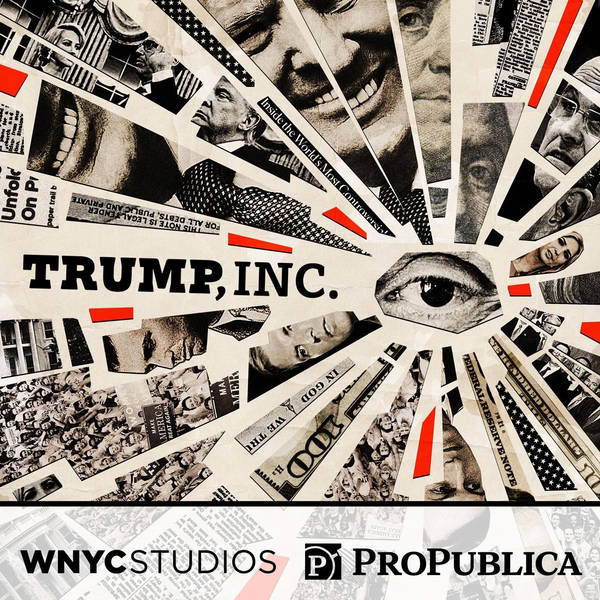
Where’d Trump’s Record Inauguration Spending Go? 'It’s Inexplicable'
Last month, the committee that ran President Donald Trump’s inaugural festivities released basic details about its revenues and spending. Trump raised $107 million, almost twice the previous record, and spent $104 million. The committee’s tax filing showed that $26 million of the spending went to an event planning firm started in December by a friend of the First Lady.
It’s not clear how the firm spent that money, or how most of the money raised for the inauguration was used. The tax filing doesn’t show spending by subcontractors, nor is it required to do so.
In this week’s episode of Trump Inc., we dig into the inauguration. We’ve found that even experienced inaugural planners are baffled by the Trump committee’s massive fundraising and spending operation. We also noticed that two members of the inaugural committee have been convicted of financial crimes, and a third — the committee’s treasurer — was reportedly an unindicted co-conspirator in an accounting fraud.
Greg Jenkins led President George W. Bush’s second inaugural committee in 2005, which raised and spent $42 million (that would be $53 million in today’s dollars). Asked about how Trump’s team managed to spend so much more, Jenkins said, “It's inexplicable to me. I literally don't know.”
“They had a third of the staff and a quarter of the events and they raise at least twice as much as we did,” Jenkins said. “So there's the obvious question: where did it go? I don't know.”
Steve Kerrigan, who led both of President Obama’s inaugural committees, agreed. “There was no need for that amount of money,” said Kerrigan.” We literally did two inaugurations for less than the cost of that.”
According to Trump’s filing, slightly more than half of the money went to four event-planning companies, including the firm owned by the First Lady’s friend, Stephanie Winston Wolkoff. Her company, WIS Media Partners, paid the co-creator of “The Apprentice,” Mark Burnett, to help with the festivities, as the New York Times reported.
Melania Trump has since cut off her work with Wolkoff after the disclosure of the spending. Wolkoff and WIS Media Partners did not respond to a request for comment.
We asked the White House and the inaugural committee about fundraising and spending related to the inauguration. Officials did not agree to be interviewed on the record.
We also looked at members of the inaugural committee, which had about 30 people in leadership and fundraising roles.
The committee’s treasurer, Doug Ammerman, was named by prosecutors as an unindicted co-conspirator in a tax shelter fraud in the early 2000s, according to the Wall Street Journal. Ammerman was a partner at the accounting firm KPMG, which later admitted criminal liability. A Senate investigation from the time includes emails from Ammerman suggesting he was aware of the scheme.
Ammerman is also currently accused in a shareholder lawsuit of dumping stock in a grilled chicken chain, El Pollo Loco, where he was on the board, ahead of a bad quarterly report. Ammerman did not respond to requests for comment.
The finance vice-chair for the inaugural committee, Elliott Broidy, pleaded guilty in 2009 to paying bribes to get investments from the New York State pension fund. His felony conviction was later downgraded to a misdemeanor. Broidy, a top Trump fundraiser, has also come under scrutiny in Special Counsel Robert Mueller’s investigation. Broidy did not respond to requests for comment.
Another inaugural organizer was Rick Gates, the former deputy to former Trump campaign manager Paul Manafort. Gates pleaded guilty this year to lying to the FBI and to conspiracy in a vast money laundering scheme, charges that came from Mueller’s office.
At the time that Gates worked on the inauguration, he had not been indicted, but his dealings with former Ukrainian strongman Viktor Yanukovych had already come under scrutiny. Gates’ business partner, Manafort, was forced off of the Trump campaign in the summer of 2016 after it was reported he got nearly $13 million of undisclosed payments from Yanukovych. Gates did not respond to requests for comment.
We found one more thing that set this inauguration apart: Some of the donations are almost impossible to trace. As the Center for Responsive Politics reports, two “dark money” groups, which do not disclose their donors, gave $1 million each. Trump’s inaugural committee appears to have been the first to accept significant donations from dark money groups.
Kerrigan, Obama’s inauguration chief, said he would have rejected a check from a group designed to preserve donor anonymity. “I would have said, ‘Prove who you are and if you can’t pass vet, I’ll have to give the check back,’” Kerrigan said.
There are also, of course, many donors we do know about. Like other presidents, Trump raised millions from corporate contributions and wealthy individuals. The securities and investment industry contributed the most, nearly $15 million. Other top industries included real estate, casinos, oil and gas, and mining — each of which later benefited from various presidential initiatives and policies. The existence of a contribution, of course, doesn’t mean that’s the reason for a policy change.
Click here to explore OpenSecrets’ analysis of inaugural contributions. And click here to check out journalist Christina Wilkie’s easy-to-search spreadsheet of inaugural donors.
